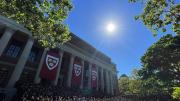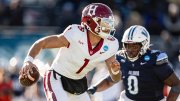On Wednesday, May 24, at the annual Baccalaureate ceremony, Lawrence S. Bacow addressed the senior class that arrived the same year he began his service as Harvard’s president. “I find it fitting that we are gathered here today in these billowing robes that you are all wearing,” he said, “a symbol not only of our membership in a community of learning but also of our experience these past four years, our experience of a Harvard—of a world—blown about by winds that, candidly, never existed before.” This was the first in-person Baccalaureate address since 2019, and perhaps the first to be held outdoors—with friends and family arrayed behind the seniors seated at the front of Tercentenary Theatre—since the ceremony’s origins in the seventeenth century, as pandemic-related deferrals swelled the size of this year’s graduating class to the point that its members could not fit in Memorial Church. The occasion also marked the first Baccalaureate conducted by Matthew Ichihashi Potts, who became the Pusey minister on July 1, 2021.
“Candidly, when I made the difficult decision to send you all home on such short notice in March of 2020,” Bacow told the class, “I never imagined that two years later—and after one million people had succumbed to this virus in the U.S. alone—that we would still be dealing with a public health crisis. Your class has been tested in ways that few others have been. You’ve demonstrated extraordinary resilience and patience, both skills that will serve you well as you prepare for life after Harvard. Based upon what I have seen of you and how you’ve met this moment, I have great faith that you, like those who came before you, will find your way, and will make your mark on this world. Let me take this moment, right now, right here, to thank each and every one of you for your perseverance, for your flexibility, and for your understanding.” Bacow, who has served as chancellor of MIT, president of Tufts, and as a member of the Harvard Corporation, added that he didn’t think he had “ever been prouder of any graduating class at any university that I have been affiliated with than I am of the Harvard College Class of 2022.”
Bacow then reflected on the difficulty of trying to plan a career, something very much on the minds of the seniors before him. “On the day you retire you can look back, and at that point it all makes sense. You will be able to identify the inflection points, the decisions, that brought you to where you ultimately wound up” he said. “But when you’re actually confronting these decisions in real time, you guys are going to struggle. You will make lists of pros and cons, benefits and costs. You’re going to consult with your friends. You’re going to consult with your family. And… you’re going to agonize over these choices long into the night…. I really know what I am talking about,” he sympathized, “because I have been there.”
Bacow recalled that after earning his doctorate at Harvard, he and his wife Adele were planning to move to Washington, D.C., when an “unexpected opportunity” came up at MIT. That was followed by another some years later, and another. “If I had said ‘no’ to any one of those three questions,” he reflected “I wouldn’t be standing here today. This is not to say that I am prescient or wise, or brave, none of those things—just that I was open to seeing where roads I hadn’t considered might actually take me. That way of moving through the world has taken me to some pretty interesting places—and actually being here, standing behind this podium, talking to you today, it’s just one of them.”
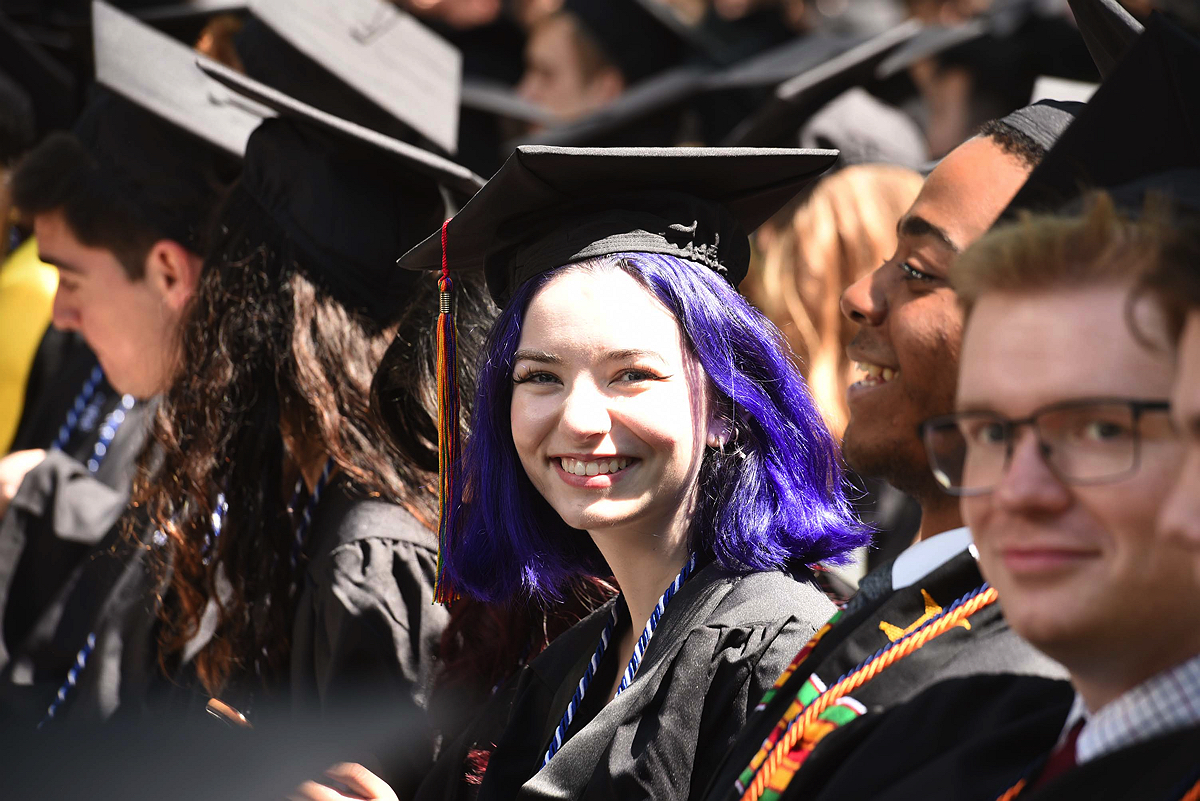
Photograph by Jim Harrison
Bacow urged the class to “Be willing to take those chances,” and added some personal advice that he learned from his mother. “When I was struggling with a difficult decision…, she would always say exactly the same thing to me, ‘Larry, what’s the worst that can happen? Can you live with that? If so, why worry? Go for it.’ I hope you are as liberated by this advice as I’ve been throughout my life.”
And he gave examples of extraordinary people who let themselves explore new roads: Ray Hammond ’71, a successful surgeon who became one of Boston’s most influential spiritual leaders; Rubén Blades, L.M. ’85, once a law student in Panama, now a Grammy-winning musician (and this year’s Harvard Arts Medalist); and Boylston professor of oratory and rhetoric Jorie Graham (profiled here), who wanted to be a filmmaker, but instead became a famous poet. As Bacow recounted, “one day, walking past an open door of a poetry class,” while a student at NYU, she heard lines from The Love Song of J. Alfred Prufrock: “‘I have heard the mermaids singing, each to each. / I do not think they will sing to me.’ But sing they did.” (In his 2019 Baccalaureate address, Bacow had shared how a different line from the same poem—‘I have measured out my life in coffee spoons’—by T.S. Eliot ’10, A.M. ’11, Litt.D. ’47, had influenced a career choice, liberating him from his father’s hope and expectation that he would become a lawyer.)
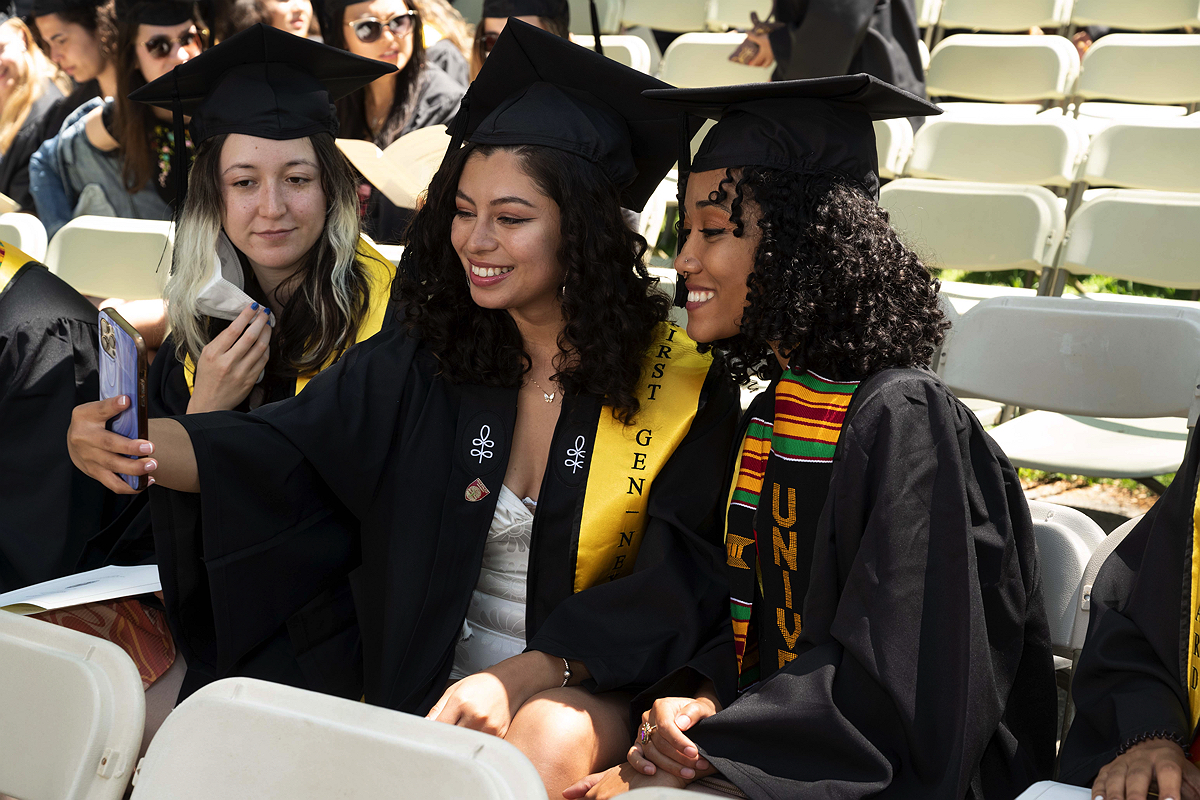
Photograph by Jim Harrison
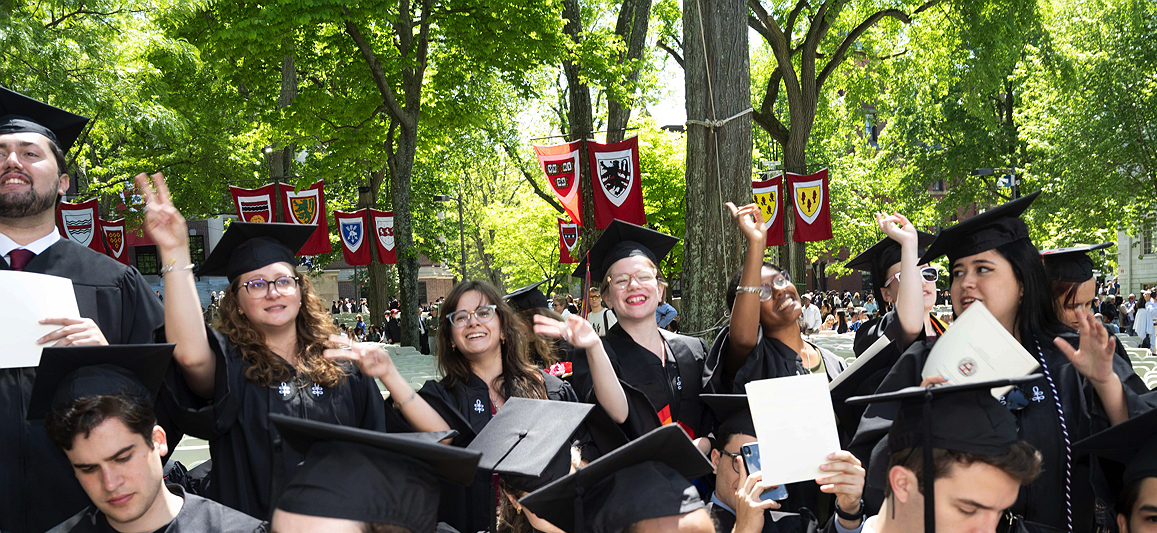
Photograph by Jim Harrison
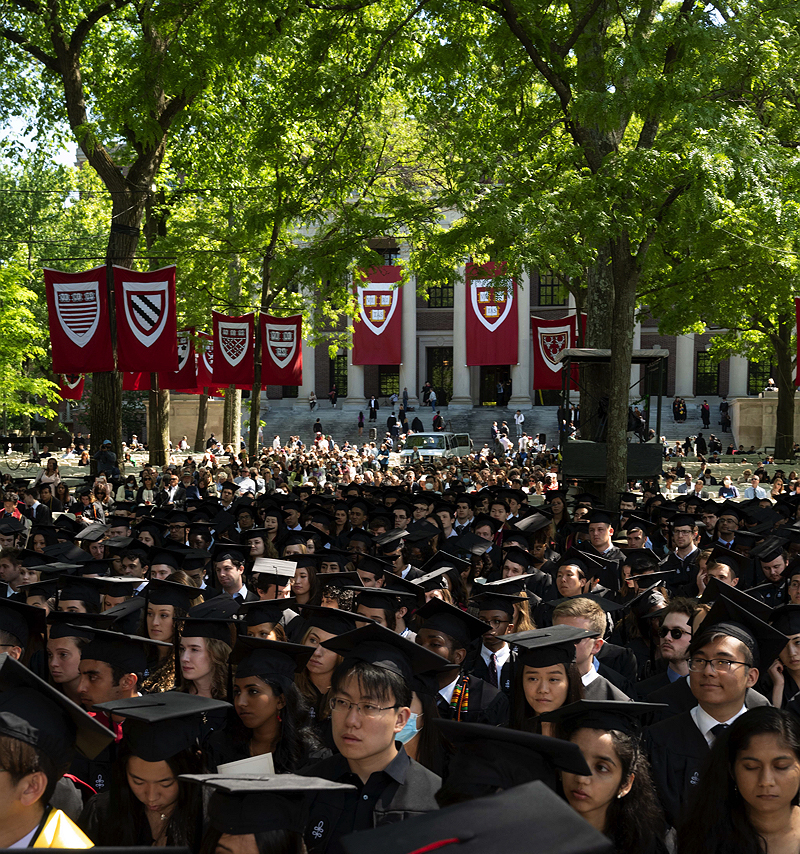
Photograph by Jim Harrison
Bacow then made a keen observation that he acknowledged the much younger generation to whom he was speaking “may shrug off as nostalgia….”
Random events of profound influence don’t just happen, and they especially don’t just happen on a screen, when you are staring at your phone or your computer. Think of a person stopping in her tracks to listen to lines of unfamiliar poetry.…Think of a person tuning into a voice, a calling greater than himself. Think of where and how those things happen—and where and how they can’t or won’t. Please…engage and embrace the world personally with passion and enthusiasm. If you do, and if you are lucky, you too will someday be inspired by the unexpected.
The Baccalaureate service, many elements of which hearken back to the religious origins of the earliest American colleges and universities, now includes readings by members of the senior class from Islam, Judaism, Buddhism, Sikhism, Christianity, and Hinduism, as well as the traditional singing of Psalm 78 to the tune “St. Martin’s,” an observance since at least 1806. This year the ceremony also included an anthem sung by the Commencement choir, “Gates of Harvard Yard”, the music composed by a member of the senior class, Jenny J. Yao ’22. Yao wanted to celebrate the physical environment “that enveloped us for the last four years—pandemic aside,” she said in an interview, noting that she was particularly inspired by the Bradstreet Gate, named for the first established female poet in the New World. One of Anne Bradstreet’s poems came to represent for Yao a reflection on her and her class’s journey—where they have been and where they are going—as they, too, prepare to explore a new world.
The full text of President Bacow’s Baccalaureate address appears here.
